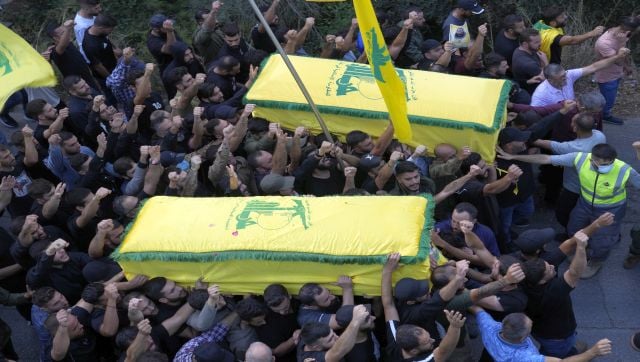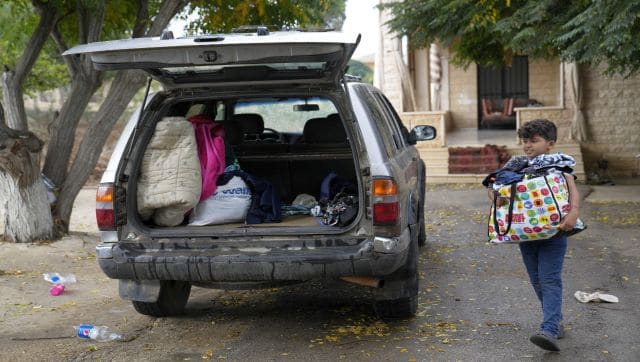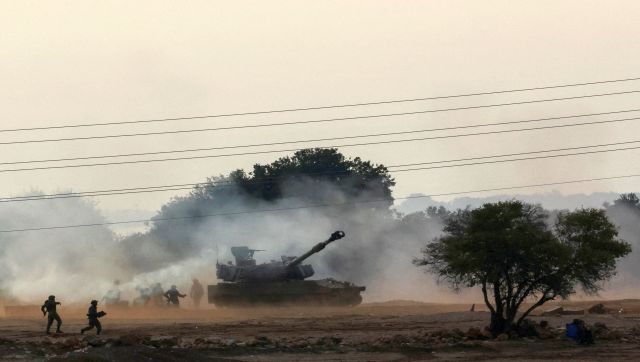Is the Israel war against Hamas extending into a multi-front battle? Even as Israel launches its fiercest airstrikes against the Palestinian militant group Hamas in the Gaza Strip, they are also facing trouble along its northern border with Lebanon. Fears are on the rise of a repeat of 2006 when Israel fought a bloody month-long war with
Hezbollah , the group committed to the destruction of the Jewish state. There have been reports that Israel and Lebanon have been involved in clashes along the border for the past few days, deepening unease over the possibility that the conflict — already the broadest invasion in 50 years — could spread to multiple fronts. We take a closer look at what’s going on at the border and what are the implications of this war turning into a larger conflict in the West Asia region. [caption id=“attachment_13233652” align=“alignnone” width=“640”] A map depicting the Lebanon and Israel border. Image Courtesy: AFP[/caption] Trading fire at the border Since Sunday when
Hamas launched its audacious attacks against Israel, which resulted in the country declaring war, there has been trepidation among the people of Lebanon as they fear being dragged into another conflict. On Monday (9 October) that fear became more palpable when a senior Israeli officer was killed in a confrontation with militants on the frontier. The Israel Defense Forces (IDF) said that the troops and aircraft killed two “terrorist infiltrators” who had crossed into Israeli territory. The slain officer was identified as Lt Col Alim Abdullah of the 300th “Baram” Regional Brigade. The Gaza Strip-based Palestinian Islamic Jihad terror group claimed responsibility for the armed infiltration on its Telegram channel, saying this was part of the ongoing war between Israel and terror groups in Gaza. [caption id=“attachment_13233682” align=“alignnone” width=“640”]
A Lebanese girl looks through a shattered glass window after Israeli shelling landed near her house, in Dahaira village, South Lebanon. AP[/caption] The clashes between the militants and Israeli troops occurred near the northern Bedouin Israeli town of Arab al-Aramshe and the Lebanese village of Dhayra. The next day (10 October), Hezbollah, who has extended support to Hamas, fired a guided missile at an Israeli military vehicle. Israel retaliated by hitting a Hezbollah observation post. The New York Times said in one of its reports quoting the Israeli forces that 15 rockets were fired over the border from just outside the Lebanese city of Tyre, on the Mediterranean coast, with four of them being intercepted. However, it was not certain as to who had fired the rockets. The same NYT report also quoted two Lebanese army officials claiming that Israel had used white phosphorus munitions, the use of which can be a violation of international law when civilian areas are targeted. This border action was preceded by Hezbollah firing artillery shells and guided missiles at Israel on Sunday (8 October) “in solidarity” with attacks launched from Gaza by its ally Hamas. The continuous attacks along the Israel-Lebanon border have prompted intensive patrols from both sides. Moreover, all public and private schools located south of the Litani Line, especially in the districts of Tyre and Bint Jbeil, have been asked to remain shut. The Lebanese University announced the closure of all its branches in the south, in Nabatieh, Tyre and Bint Jbeil, “due to the tense security situation on the southern border.” [caption id=“attachment_13233702” align=“alignnone” width=“640”]
 Hezbollah supporters carry the coffins of the two Hezbollah fighters who were killed by Israeli shelling, during their funeral procession in Kherbet Selem village, south Lebanon. The Iran-backed group announced that three militants died following heavy Israeli shelling in border towns across southern Lebanon. AP[/caption] It has also been reported that Lebanon’s caretaker Prime Minister Najib Mikati has called for a Cabinet session today (11 October) “to discuss the security situation in the country and the measures taken”. On the Israeli side, the villages along the border appeared deserted as residents took shelter indoors. The Israeli military said it had not issued them with any orders to leave. However, some people were relocating southward as a temporary precaution. Meanwhile, UK through its embassy in Lebanon has “advised travel only when necessary and not to go to certain areas south of the Litani River, which include the Naqoura-Tyre-Sidon-Beirut Highway and the areas west of it.” [caption id=“attachment_13233632” align=“alignnone” width=“640”]
Hezbollah supporters carry the coffins of the two Hezbollah fighters who were killed by Israeli shelling, during their funeral procession in Kherbet Selem village, south Lebanon. The Iran-backed group announced that three militants died following heavy Israeli shelling in border towns across southern Lebanon. AP[/caption] It has also been reported that Lebanon’s caretaker Prime Minister Najib Mikati has called for a Cabinet session today (11 October) “to discuss the security situation in the country and the measures taken”. On the Israeli side, the villages along the border appeared deserted as residents took shelter indoors. The Israeli military said it had not issued them with any orders to leave. However, some people were relocating southward as a temporary precaution. Meanwhile, UK through its embassy in Lebanon has “advised travel only when necessary and not to go to certain areas south of the Litani River, which include the Naqoura-Tyre-Sidon-Beirut Highway and the areas west of it.” [caption id=“attachment_13233632” align=“alignnone” width=“640”] A Lebanese boy carries his belongings as he flees his house with his family after Israeli shelling in Dahaira border village with Israel, south Lebanon. AP[/caption] An Israel-Lebanon standoff in the making The attacks at the border are raising concerns of a repeat of 2006. Hezbollah, which is considered as Iran’s proxy, captured two Israeli soldiers with the aim of doing a prisoner swap deal with Israel. However, Israel retaliated with heavy bombardment and destroying wide areas. This situation led to a 34-day long war between the two, with a steep cost to human life, but it gave Hezbollah a huge reputation boost across the wider Arab world as it celebrated its ability to withstand a full-throttle Israeli assault. Since then, both countries have staved off any major face-off. As one political observer told Arab News: “Lebanon and its economy cannot bear the repercussions of any new war with Israel that breaks out in the south and extends to the rest of the country.”
A Lebanese boy carries his belongings as he flees his house with his family after Israeli shelling in Dahaira border village with Israel, south Lebanon. AP[/caption] An Israel-Lebanon standoff in the making The attacks at the border are raising concerns of a repeat of 2006. Hezbollah, which is considered as Iran’s proxy, captured two Israeli soldiers with the aim of doing a prisoner swap deal with Israel. However, Israel retaliated with heavy bombardment and destroying wide areas. This situation led to a 34-day long war between the two, with a steep cost to human life, but it gave Hezbollah a huge reputation boost across the wider Arab world as it celebrated its ability to withstand a full-throttle Israeli assault. Since then, both countries have staved off any major face-off. As one political observer told Arab News: “Lebanon and its economy cannot bear the repercussions of any new war with Israel that breaks out in the south and extends to the rest of the country.”
Israel-Palestine war: Related coverage _Hamas, Hezbollah & Intifada: A guide to understanding the glossary of Israel-Palestine conflict_ _Horror of Hamas: Inside the Israeli kibbutz where children and women were beheaded_ _How Hamas uses tunnels in Gaza to target Israel_ _Is Israel preparing a ground invasion of Gaza?_ _How a drawn-out Israel-Hamas war could hurt the Indian economy_ _Stand with Palestine, says Saudi Arabia. Will ‘normalisation talks’ with Israel be affected?_ _Israel-Palestine conflict: Where does India stand? Which countries back Hamas?_
Larger war looms large Many geopolitical experts fear that Israel’s ongoing war against Hamas could extend into a larger battle in the West Asia region. Some believe that Israel’s furious reaction to Saturday’s attack could prompt Hamas’ Lebanon-based ally Hezbollah to open a third war front on Israel’s northern border. If this happens, it could eventually lead Israel and its key ally, the US, to consider direct military action against Iran. In fact, the US has already warned Hezbollah not to get involved. [caption id=“attachment_13233732” align=“alignnone” width=“640”] Flame and smoke rise over Lebanon as seen from Israel’s border with Lebanon, in northern Israel. Reuters[/caption] Now, diplomatic efforts are on to ensure that such a situation doesn’t occur, but West Asia analysts doubt that this will bear fruit. “It’s unlikely,” Hussein Ibish, a senior resident scholar of the Arab Gulf States Institute in Washington, told the South China Morning Post. “Israel seems traumatised and bent on revenge, while Hamas appears intoxicated with a false sense of victory and accomplishment.” It is improbable that “any country or set of arguments will be able to convince the Israelis not to try to smash Hamas as much as possible”, he said. As of now, Iran has denied any
involvement with Hamas’ attacks on Israel; the US has also said that there is no specific information about the role of Tehran in the latest terrorist attack. However, intelligence officials believe that there is a connection, with some adding that the link was undeniable. However, it is certain that if Israel attacks Iranian territory, they will feel compelled to retaliate more openly as well in some manner or another. With inputs from agencices


)

)
)
)
)
)
)
)
)



